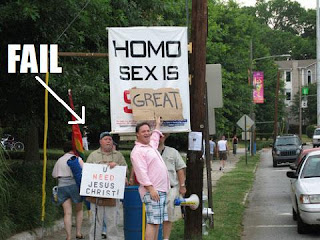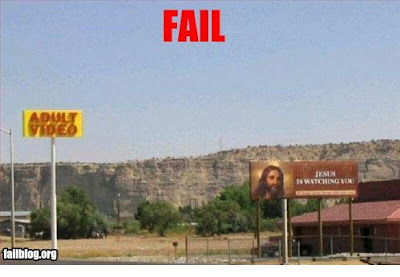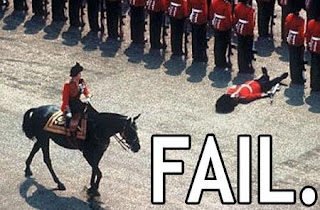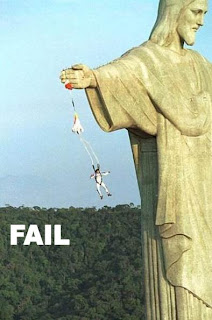A central concept to Christianity (as presented in the bible, not on TV) is the idea that as human beings, we are imperfect, and start out with a dysfunctional, disrupted relationship with a God who is worth knowing and actually really wants to know us and be known by us.
Thing is, the starting ground upon which we stand before God puts us in the position of someone who has made a false claim, and we will be held responsible to come good on this claim unless we are willing to give up this ground. God, for His part, is quite willing to let us off the hook if we’ll let Him, but if we won’t give up the charade, His Hands are somewhat tied.
In order for the two of us to meet halfway, we can’t just continue stubbornly holding our distant, self-justified positions (“You’re unreasonable!” “You are selfish and lacking in integrity!” “Your standards are impossible for human beings to achieve!” “You are hurting other people for your own selfish reasons!”) but we have to “die” to our rigid, inflexible, righteous positions, and be flexible enough to lay all of it aside and come to a central meeting point. We have to be “born” into entirely new roles.
As human beings, we need to reach the point where we stop disagreeing with the Source of all Good, the Judge of All The Earth as to what is fair, how we’re doing, and what good and right actually are, as seen in our abilities to properly be what we were created to be. We have to lay aside “But I tried as hard as I could” and “That’s too hard” and "But he pushed me" and “That’s not fair” and “You wouldn’t throw the book at a guy like me,” and so on. Hardest of all, we have to lay aside “If I keep at this, with the proper religious supports, I just might be able to meet God’s exacting standards for what a human being is supposed to be, or close enough that He won’t do His job and call it like it is.”
What God did was (in incarnation) lay aside His right to judge and His place as God, and take on a body and a human position with all of its temptations, stressors and limits. He then walked around, not judging, not saying any of the things that would signal that he was closing the book on humans and giving up. He talked to people and put out his hand and offered healing, insight, wisdom, forgiveness and help getting started on a better path. Best of all, he offered to alleviate each person’s duty to meet His impossible standard as codified in the Mosaic law.
He lived a whole human life, not as God Who Judges, having given that up, but as God Here Being Man So We Can Get To Know Each Other More Deeply.
For our part, as humans, we have the chance to live, no longer as Humans Who Fail and Are Judged If We Can’t Meet God’s Standards (having given that up, or “died to it” as the apostle Paul would explain it) but as Children God is Helping Out and Showing Stuff To. We get a Learner’s Permit for life. God becomes driving instructor rather than road test official.
God as Jesus is born human, and goes around studiously "not being God" so it's fair ("Why callest thou me good? there is none good but one, that is, God") and tells us to be born anew, to live our daily lives as new creatures, no longer any more responsible to keep the Mosaic law and meet God’s quite reasonable standards for how a being created in His image should respond, both to Him, and to others like created.
When Paul writes to the Romans, the part we tend to call “Chapter 7” has a section which fully paints the picture of a human being who has fully realized his own limits, who is now fully in possession of the understanding that he’s not going to be able to satisfy God without the help that is offered from on high.
The description is very clear: Paul can “will” or want to do good things, vow to be strong and kind and wise and meek, but his flesh (a metaphoric description of man at his best, falling short, being incomplete, giving in to the temptation to not walk according to What Is, to What God Wants, and What Would Be Good) is too weak, too childish, too foolish, too dark. Every time Paul says, “I hereby resolve to be better in this way and not do or want to do any of these bad things any more” he finds that there is something rotten through at the core of the infrastructure, and that it is weak and corrupted, and it all goes wrong every time, eventually.
The best of intentions fails to materialize in the harsh light of day, and troubling tendencies toward dark, petty, destructive behaviour are seen.

The Mosaic law is good, in that it presents perfectly a codified picture of What God Expects As A Bare Minimum. It does not present how to be good. It presents how not to be bad. (Not how to excel. Just what would constitute failure.) The best it can offer is, if one were somehow able to keep from doing the things it describes as bad, then one has not done bad. God knew what He was doing when He didn’t lay a responsibility to be good on the Israelites. He was making a big point that human beings without help, without collaboration and cooperation from Him, couldn’t even keep from doing bad, stupid and weak things throughout their lives.
Point taken. What now?
One of Carl Jung’s contributions to modern psychotherapy is the idea of a “shadow self.” The concept is simply this: there are parts of our personalities, of our inner selves, which we are tempted to pretend do not exist, habits or choices we are secretly drawn to which we want to tell ourselves we actually detest. It’s up to us what percentage of our unflattering inner selves we will pretend do not exist, or refuse to deal with.
The more we push these dark parts of us far back into the blackest corners of our selves, the more they are “off our radar” and will start repeatedly manifesting outwardly in troubling ways which are as much a surprise to us as to anyone looking on.
Another thing creating a strong "shadow self" by consigning a really significant part of us to supposed nonexistence will do is to cause us to “project,” so that the dark parts of our own selves are soon all we can see in others. The more we fail to accept the very existence of these darker parts of ourselves, the more we "meet" our own weaknesses everywhere we turn, in everyone we meet.
Paul speaks of a concept quite like the Jungian shadow self when he writes, “For I know that in me (that is, in my flesh) dwelleth no good thing” and explains, “For the good that I would, I do not: but the evil that I would not, that I do.” He expresses how easy it is to have noble ambitions, but how impossible it is to live as if the darkness were not present, saying “for [to] will is present with me; but how to perform that which is good I find not.”
No matter how lofty, religious, scientific or sensible the plan, it all comes down to wishful thinking and empty resolutions. It all comes down to pretending we have more say than we do in what we will do and feel, when it comes to "the crunch."
The answer to Paul’s dilemma is not acts of piety, the imitation of outer forms of religious behaviour, self-flagellation, penitence, law, religion, self-loathing and thinking upon his own wretchedness, or pretending that he can “just say no” when he needs to. No, he reaches out for the Hand of God, extended on purpose to help him in this very situation.
God comes to earth as Jesus, to say “Here. You’re doing it wrong. This is how it’s done. It’s not the letter, but the spirit of it that’s the key. The letter kills (will condemn you), but the spirit I manifest here is intuitively grasped, is quite contagious, and the truth of it is able to set you free from all of this.”
To further step apart from the rigid, adversarial roles that aren’t helping, God says “And if you agree to stop pretending you can do this right, completely without My help, I’d be overjoyed to remove from you that responsibility to do good rather than evil (knowing what they are, as you do) without My help. Then we’ll move ahead under a completely different understanding, in a completely different relationship. That's going to get us both what we want a whole lot better.”
Paul thanks God that through Him in the form of Jesus Christ, Paul is delivered from this unenviable position. He no longer lives a life with the understanding that, without any help from God he won’t screw up. He will screw up. God and Paul have agreed that this is the case, and to work together to deal with it. God as Jesus has redirected any of the judgement that God as judge would otherwise be responsible to aim Paul’s way, onto Himself.

So, Paul screws up. He steals an Oh Henry bar. He loses his temper with someone who doesn’t deserve it, feels superior to him, and cusses him out just to feel better about himself. This whole time, he lusts after the wife of someone he knows, rather than going and winning the heart of a woman he can call wife. As a human being, gifted with the knowledge of good and evil (but not the ability to do good), he knows that this isn’t good.
If things with God hadn’t all changed, he’d be in trouble now. He’d be completely responsible to not do and be that fleshly, sinful, stupid, mean kind of person. He’d stand accused, convicted and awaiting punishment. But the punishment is gone. Even the accusation is gone. You see, Paul is no longer responsible not to ever sin. He has laid aside that responsibility, that understanding, that ground, that role.
This doesn’t mean that if he sins, or acts stupid, weak, corrupt or fleshly that this is now good. It doesn’t mean that his failure isn’t bad. But it isn’t anymore Paul’s obligation to never do bad things. Together, he and God can address the root of the problem. He can grow increasingly into a person who shows more and more of the spirit of Christ and is less and less weak and corrupt, and while he grows, the pressure is off because he’s got as many mulligans, as many do-overs, as he needs. This used to be called “grace.” It doesn’t make sinning ok. It just means we have a special arrangement whereby when we do things that aren’t ok, it’s handled.
It is very possible for Paul to lose sight of his new arrangement with God. It is very possible for him to, quite apart from God, adopt a bunch of ritualistic behaviours intended to brainwash him into stopping doing the bad things that he genuinely, deep down, actually wants to do and doesn't know why. The more he cuts off from parts of his real, imperfect inner self, the more divided he becomes. Jesus pointed out that a house divided against itself will fall, all as part of explaining how stupid the accusation that he was casting demons out of people by using demonic power was.
The Jungians have a point when they say that, the more you push those “darker” parts of you away and refuse to look at them and accept that they are real and relevant and there, the more you are creating a monstrous part of yourself which will pop up in the very worst places and times. Men love darkness rather than light, Jesus said, because their deeds are evil. When you've got something to hide, you love having unmentionables, taboo subjects, and lots of shadows.
Jesus said this, and Robert Louis Stevenson wrote The Strange Case of Doctor Jekyll and Mr. Hyde about a man who tries to scientifically remove all the dark, ugly and bad parts of himself, leaving only the good, handsome and noble, and in so doing repeatedly becomes and lets loose an ugly, violent, selfish little monster on the city. When religion tries the same thing in real life that Henry Jekyll tried in science fiction, exactly the same result is seen.
Moving in religious circles can very quickly engender competitive piety, and fear of not being genuinely affected by what everyone else is immersing themselves in, resulting in pretence.
The thinking of Carl Jung led (somewhat indirectly) to the thinking of the men who formed Alcoholics Anonymous. For this particular addictions program to work, it is essential that people are able to let the cold light of day shine upon the dark corners of their inner selves, and to walk in the truth of what’s really going on.
There could be no more useless addictions program (let's call it "Abstinence Rocks!") than one at which people merely sang songs about how great it is not to be addicted, and then didn’t let on whether or not they were actually, personally struggling with addiction in any way, then drank coffee and went home.
Conversely, an addictions program (let's call it "Never Forget What You Are") that only allowed addicts who were clean to participate in any way, and which felt that the best way to deal with these "clean" addicts was to fill each session with numerous reminders to feel deep, unrelenting shame for what they’d done in the past, and then a careful, dutiful, studied dread as to what future missteps they might take, then to drink coffee and go home crestfallen, would be equally pointless, and truly horrible.
When I meet Christians, I must admit I tend to judge them on how much of themselves they are able to be. I think of them as "more alive" if they are being more of themselves, and "less alive" if most of them is locked away in a cell with loose bricks and a shovel in one corner. With too many, it’s like they’re letting themselves feel free to be only a 5% of themselves that they’re content with, and their eyes show the strain of keeping 95% of their deepest, darkest, truest, most passionate selves secret, crushed flat, relegated to the shadows with no hope of any change apart from their outer shells getting more and more brittle, and Mr. Hyde going on more insidious nightly prowlings.
The lacks are not usually seen in their thinking so much as in their emotions being unconvincing, due to not being their own, real feelings coming from their own, real selves.
If the work of Christ works for you, then the idea is to be able to sit down whenever you want with a friendly God and let Him shine the light of truth on anything inside you that He thinks needs looking at. Despite what the effect of modern religion upon people usually is, God Himself doesn’t shine this light into your dark corners because He wants to remind you of things you need to feel shame about, because you forgot or didn’t know to feel it.
He does it to make you free from more and more stuff through demystifying and revealling the true nature of it all, to make you more yourself, more what He intended you to be when He thought “Hey! Y’know what? I think I’ll make a [George Simmons or whatever].” When God says "Hey! You're doing that wrong!" He means "Hey! You're being you wrong!"

It is scriptural and healthy to view ourselves as dead to the old problems and obligation before God to not sin, and born anew to a new way of living and dealing with God. It is unscriptural and unhealthy to view ourselves as divided now into two halves (“natures”), one of which (the 5%) has turned over a new leaf, and the other of which we don’t talk about, but wrestle with daily, from the moment we open our eyes in the morning to the moment we close our eyes in repose at night. The work of Christ worked. If we're trying to do it ourselves, then we're doing it wrong.
God is ceaselessly, endlessly creative. He insists upon and delights in staggering diversity. Just look at kinds of butterflies He felt it important to design. In a way, knowing Him will make you more, not less different from His other children. There is no one-size-fits all path. Mottos, platitudes and mass-produced and distributed “individual interpretations” won’t cut it. They need to get tossed out in favour of something realer, truer and more alive.


No comments:
Post a Comment